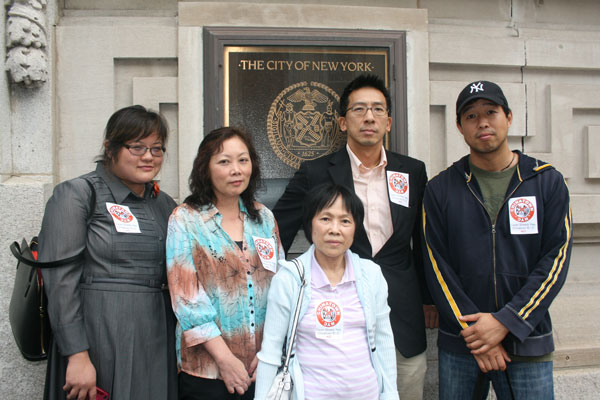
BY ALINE REYNOLDS | After a highly contentious debate among community members, the City Council unanimously voted in favor of the Chinatown Business Improvement District at its meeting on Wednesday, Sept. 21. Mayor Michael Bloomberg’s signed the legislation on Tuesday night.
More than three-quarters of the B.I.D.’s first-year budget, which totals $1.3 million, will be allocated to supplemental sanitation services, while the remaining funds will finance holiday lighting, maintenance of street lampposts and furniture and other area services. Assessment fees range from $1 for condominium owners to up to $5,000 for large property owners, the majority of whom will pay $700 annually. Approximately three-quarters of the district’s 2,300 property lots will owe $1,000 or less per year.
With respect to trash, the Council advised the future B.I.D. to increase garbage collection prior to 8 a.m. based on concerns raised by local business and property owners. “The B.I.D. will enhance and retain business in Chinatown by supplying very significant sanitation services within the B.I.D.’s boundary,” said Council Speaker Christine Quinn at a Sept. 21 press conference announcing the City Council vote.
The B.I.D. won’t be up and running until next year, since it typically takes between four and nine months for B.I.D.s to be established once they pass the Council, according to a spokesperson at the city’s Department of Small Business Services.
Councilmember Margaret Chin deemed the B.I.D.’s passage a victory for the neighborhood that was a long time in the waiting.
“This is a historic moment for us in the community and we will celebrate,” Chin said. “The bottom line is Chinatown residents and business owners deserve clean streets, more customers, and prosperity. Now, Chinatown will be ready to join the rest of Lower Manhattan in its rebirth. We will be able to enjoy a clean environment that’ll be great for everyone.”
Rather than garner additional support, however, the Council’s sweeping pro-B.I.D. vote only fanned the flames among its chief opponents such as neighborhood property owner Jan Lee. Lee, who helped amass 600 objections to the B.I.D. as part of an anti-B.I.D. campaign over the summer, said he was disappointed in the City Council for “completely ignoring any further investigation about the legitimacy of whether or not the community wants” the B.I.D.
That said, Lee is “optimistic” that the B.I.D. is a temporary entity rather than a permanent fixture in Chinatown. Lee and fellow property owners that objected to the B.I.D.’s passage are even considering taking legal action against the entity once it is formed.
“We’re going to continue with protesting, [Freedom of Information Law] requests, and inquires,” said Lee. “We will use every resource available to us until the B.I.D. is fully dismantled.”
According to the city’s Department of Small Business Services, B.I.D.s can be dissolved if at least 51 percent of the district’s property owners, or alternatively the property owners of 51 percent of the district’s total assessed value, submit written petitions to City Council.
“The B.I.D. law makes provisions for B.I.D.s that have been installed and are unpopular,” said Lee. “We will make every effort to prove legally that this is not only unpopular, but that it was installed completely under dubious conditions.”
Lee and other neighborhood property owners are now fearful of losing their ground-floor commercial tenants, some of whom have said they would have to close down shop if they incur an additional expense.
Sam Kwok, owner and manager of Shanghai Asian Manor at 21 Mott St., would have to fork over hundreds of dollars more to Lee per year once the B.I.D. is in place. As a result, Kwok said he might have to shut down his restaurant entirely. All 30 restaurant employees would be out of work since he wouldn’t be able to afford opening his business at another location.
“I’m very upset,” said Kwok. “We can maintain streets [on our own]. We don’t need an organization to do this.”
“I’m worried I might not have my job,” said Kelly Chang, assistant manager of the Manor. “It’s not easy to find a job nowadays, so if he closes, it’s really bad. Hopefully a miracle happens.”
An added fee would be an insult to injury for Robert Purnick, owner of a Mott Street retail store named Whole World Fashion Boutique, who said he might have to shutter his business because revenues are declining every month. Purnick and other local business owners are responsible as is to pay for private carter companies to collect their trash.
“It just seems like a total waste,” Purnick said of the B.I.D. “We have to clean in front of our stores and pay for sanitation anyhow.”
“I find it pretty unfair. We pay the tax [already], and the city’s supposed to do the cleaning,” echoed Mee Wong, who owns property at 88-90 Walker St.. “We don’t need a duplicate expense to clean the street.”
Chin, however, contends that B.I.D.s are implemented precisely to help businesses flourish, to not hinder their success. The assessment fees, she explained, will be offset by the profits businesses will rake in from the added clientele the B.I.D. will encourage by way of signage, advertising and other forms of publicity. “When we attract more business into the community and the community becomes more prosperous, I think a lot of these business owners will also be able to prosper and pay the fees,” said Chin.
Other neighborhood property and business owners believe the B.I.D. will supply much-needed supplemental services to the community. Longtime neighborhood property owner Wellman Wu, who owns buildings on Mott and Canal Streets, said he isn’t worried about the assessment fees.
“I just consider that as part of our business espense,” Wu. “People do some service, you have to pay for it. If it’s a dirty area, then we will lose our customers.”
Peter Lau, who owns and runs two pharmacies in Chinatown, believes the area’s improved streetscape will improve Chinatown’s reputation and therefore generate higher revenues.
“As local residents and business owners, we feel we are uplifted in a way by cleaner streets,” said Lau. “And, if you have better lighting, people will want to come and shop more, and the neighborhood will become more desirable.”
Bethany Li, a staff attorney at the Asian-American Legal Defense and Education Fund, argued that the gentrification caused by the B.I.D. would eventually lead to the displacement of local residents and small businesses.
“The developers are quoted as saying they’re welcoming the approval of the B.I.D. because they see it as a nice link and next step towards [re]zoning Canal Street to allow for more luxury high-end development,” said Li.
Chin, however, insists that the B.I.D. will improve the quality of life in Chinatown without ousting residents or businesses.
“I do not buy the argument that a B.I.D. will cause gentrification or a rapid increase in property values. That’s not the way it works,” said Chin. “These criticisms are leveled by the same people who oppose any and all efforts to make our community better.”


























